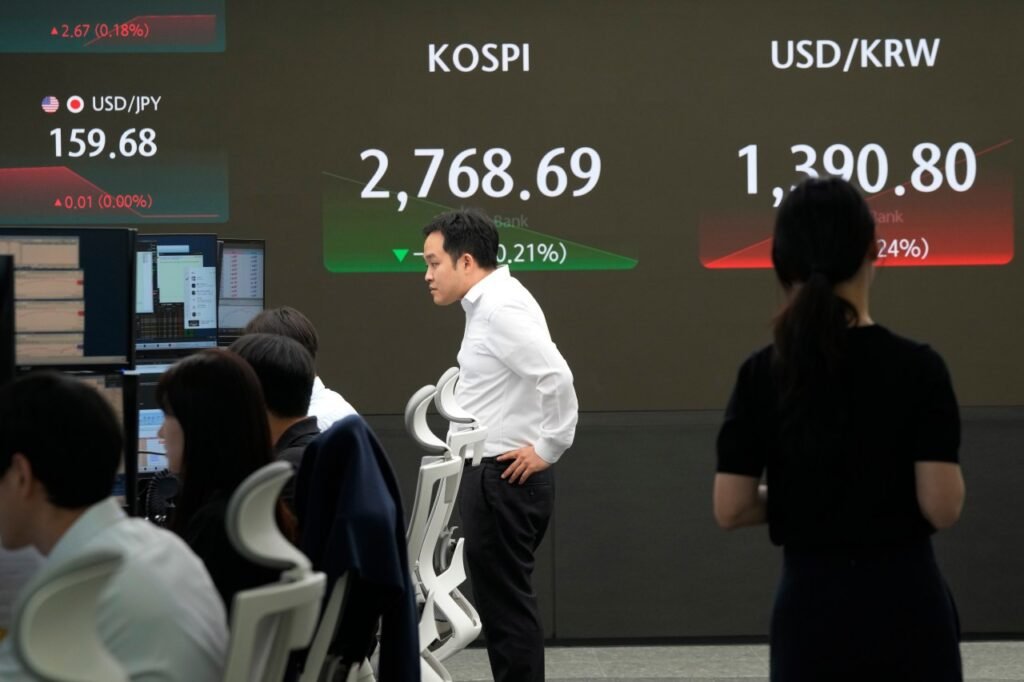
Currency traders work near screens displaying the Korea Composite Stock Price Index (KOSPI) (top left) and the exchange rate between the U.S. dollar and the South Korean won (top right) in a foreign exchange trading room at the headquarters of KEB Hana Bank in Seoul, South Korea, Wednesday, June 26, 2024. (AP Photo/Ahn Young-jun)
BANGKOK (AP) — Asian stocks were mixed as a rebound from Nvidia helped offset weakness on Wall Street.
Japan’s Nikkei stock average rose 1.3 percent to 39,667.07 as enthusiasm for Nvidia and artificial intelligence spurred strong demand for technology stocks.
Tokyo Electron rose 3.6%, Advantest surged 7%, and Shin-Etsu Chemical rose 1.5%.
Meanwhile, the dollar rose slightly against the Japanese yen, and officials in Tokyo warned of possible market intervention.
The dollar rose to 159.89 yen from 159.70 yen. The euro fell to 1.0695 dollars from 1.0717 dollars.
“Fundamentally the yen remains weak and is lacking a catalyst for a reversal,” Luca Santos, currency analyst at ACY Securities, said in a commentary.
“The threat of direct intervention looms if the U.S. dollar/yen exchange rate crosses the 160 yen threshold,” he said, noting that Japanese authorities have emphasized that it is not just the level of the yen but the pace of its decline that could trigger intervention.
Seoul’s KOSPI rose 0.6% to 2,792.05.
Chinese stocks rebounded after a weak start, with Hong Kong’s Hang Seng index rising 0.1% to 18,093.37 and the Shanghai Composite index rising 0.8% to 2,972.93.
Australia’s S&P/ASX 200 fell 0.7% to 7,783.00.
Taiwanese stocks rose 0.5 percent and Indian stocks added 0.7 percent. Bangkok’s SET rose 0.2 percent.
On Tuesday, the S&P 500 rose 0.4%, closing at 5,469.30, near the all-time high it hit a week ago. The Dow Jones Industrial Average, which does not include Nvidia, fell 0.8%, to 39,112.16, and the Nasdaq Composite Index rose 1.3%, to 17,717.65.
Most stocks that were out of Wall Street’s artificial intelligence technology frenzy fell. Nvidia rose 6.8%, but without that gain the S&P 500 would have tumbled for the day. The semiconductor company’s shares fell for the third straight day, dropping nearly 13%, its worst day since 2022.
Nvidia has grown into one of the largest and most influential companies on Wall Street, giving it the power to sway the S&P 500 .
Strong demand for the company’s chips, which power artificial intelligence (AI) applications, has been a key factor in the recent record rise in the U.S. stock market, as high interest rates slow U.S. economic growth slows. But the AI boom has been so feverish that it has raised concerns about a stock market bubble and investors’ overly optimistic expectations.
SolarEdge Technologies Inc. fell 20.6% after it said a customer owed $11.4 million filed for Chapter 7 bankruptcy protection, raising questions about when and how much the solar company will get to recoup. Smaller companies in the Russell 2000 Index also fell 0.4%.
Overall, sales at retail stores across the country have been up and down recently, with businesses highlighting that lower-income customers are still struggling to keep up with rising prices. But the job market still looks broadly strong. Tuesday’s report also showed that U.S. consumer confidence fell this month, but not by as much as economists expected.
High-income families appear to be on the mend as the economy improves and they’re booking trips on cruise ships. Carnival rose 8.7% after raising its 2024 profit forecast. The company said bookings for the rest of the year are at all-time highs, both in terms of prices and occupancy. And bookings for next year could be even better.
Overall, the S&P 500 rose 21.43 points to 5,469.30, the Dow lost 299.05 points to 39,112.16 and the Nasdaq Composite added 220.84 points to 17,717.65.
Yields have mostly retreated since rising above 4.70% in late April, easing pressure on the stock market. Yields have been sliding on expectations that inflation is slowing and that the Federal Reserve will cut its key interest rate later this year.
The Federal Reserve has kept the federal funds rate at its highest level in more than 20 years, hoping to squeeze the economy enough to keep inflation in check. Wall Street is hoping the Fed will cut rates at the right time. Wait too long and the economic slowdown could turn into a recession. Wait too soon and inflation could accelerate again.
In other trading, benchmark U.S. crude rose 21 cents to $81.04 a barrel in electronic trading on the New York Mercantile Exchange early Wednesday.
Brent crude, the international standard, rose 19 cents to $84.41 a barrel.

